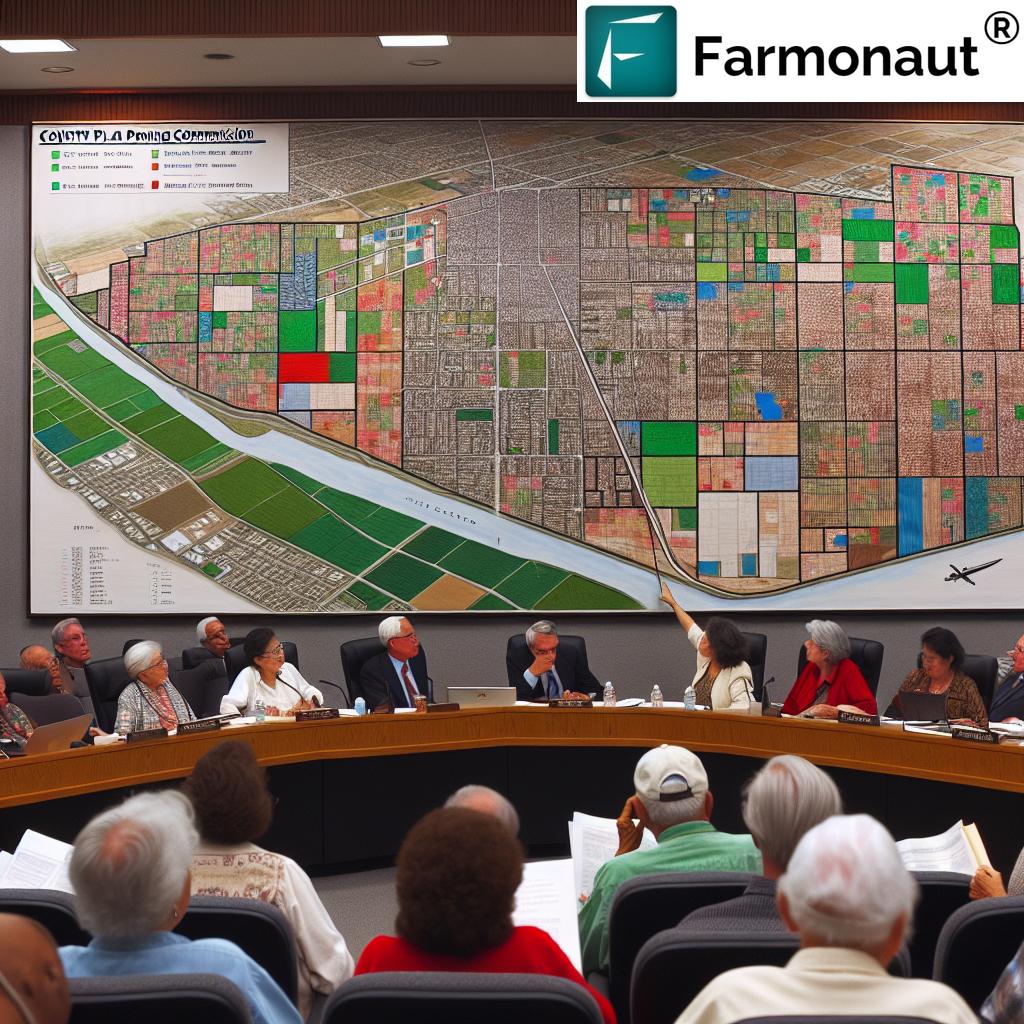Edgefield County’s New Zoning Strategy: Preserving Rural Character While Balancing Agricultural Growth
“Edgefield County’s new Residential Agriculture district could impact 1,600 properties, balancing rural character with controlled growth.”
We are witnessing a significant shift in rural land management as Edgefield County, South Carolina, embarks on an innovative journey to preserve its agricultural heritage while accommodating controlled growth. The county’s recent comprehensive plan update introduces a groundbreaking rural zoning initiative that promises to reshape the landscape of this picturesque region. At the heart of this initiative is the newly proposed Residential Agriculture district, a zoning strategy that aims to strike a delicate balance between agricultural sustainability and residential development.
As experts in precision agriculture and land management, we at Farmonaut recognize the importance of such forward-thinking approaches to rural planning. Our satellite-based farm management solutions align perfectly with the goals of preserving agricultural land and promoting sustainable farming practices. Let’s delve into the details of Edgefield County’s new zoning strategy and explore its implications for the future of rural America.
Understanding the Residential Agriculture District
The Residential Agriculture district is a cornerstone of Edgefield County’s comprehensive plan update. This new zoning category is designed to cover a significant portion of southwestern Edgefield County, potentially affecting around 1,600 properties. The primary objectives of this district are:
- Promote agricultural activities
- Support commercial enterprises that complement agriculture
- Allow for limited housing development
- Maintain the rural character of the county
Hart “Doc” Clark, the Planning Director for Edgefield County, emphasizes that while the council’s current action delineates the district boundaries and defining rules, it does not yet impose any zoning restrictions or modifications to existing land use. This measured approach allows for careful implementation and community engagement throughout the process.

The Scale and Scope of the New Zoning District
The sheer magnitude of the proposed Residential Agriculture district is noteworthy. According to Clark, this new zoning area would encompass a land mass larger than all other zoning districts in Edgefield County combined. This ambitious scale underscores the county’s commitment to preserving its rural character and agricultural heritage.
Key features of the Residential Agriculture district include:
- Permitting construction of housing while restricting large-scale multi-family developments
- Allowing agricultural practices with limitations on industrial activities
- Focusing on maintaining the rural ambiance of the county
As we at Farmonaut understand the importance of efficient land use management, we recognize the potential of satellite technology in supporting such zoning initiatives. Our platform’s ability to provide real-time crop health monitoring and AI-based advisory systems could prove invaluable for farmers and landowners within this new district.
The Road Ahead: Implementing the New Zoning District
The path to implementing the new Residential Agriculture district involves several crucial steps:
- Two additional readings of the zoning ordinance by the Edgefield County Council
- A public hearing to gather community input
- Engagement with approximately 1,600 property owners likely affected by the new district regulations
Tiffani Ireland, the County Council representative for District 2—the area most impacted by the zoning changes—highlights that the proposed regulations are directly shaped by citizen feedback. This community-driven approach aligns with our belief at Farmonaut that sustainable agricultural practices should be accessible and beneficial to all stakeholders.
Explore how Farmonaut’s satellite-based solutions can support sustainable farming practices:
The Role of the County Planning Commission
Throughout the process of updating the Comprehensive Plan, Edgefield County’s planning commission has played a crucial role. Their proactive approach to urban planning and land use management has laid the groundwork for the formation of the new zoning district. This meticulous planning underscores the county’s commitment to facilitating a significant transition while upholding the interests of its residents.
Key aspects of the planning commission’s work include:
- Engaging with local residents to gather perspectives
- Developing a community-oriented strategy for land use
- Preparing detailed zoning ordinances
- Navigating the complexities of rural development in a changing landscape
At Farmonaut, we understand the importance of data-driven decision-making in land management. Our satellite-based crop health monitoring and AI advisory systems could provide valuable insights to support the planning commission’s efforts in preserving agricultural land and promoting sustainable farming practices.

Balancing Agricultural Growth and Rural Preservation
“Edgefield County’s comprehensive plan update introduces a groundbreaking rural zoning initiative, focusing on agricultural land preservation.”
The core challenge addressed by Edgefield County’s new zoning strategy is striking a balance between agricultural growth and rural preservation. This delicate equilibrium is crucial for maintaining the county’s character while ensuring economic viability for its agricultural sector. Here’s how the new Residential Agriculture district aims to achieve this balance:
- Promoting Agricultural Activities: The zoning regulations prioritize farming and related activities, ensuring that agriculture remains a cornerstone of the local economy.
- Supporting Complementary Businesses: By allowing commercial enterprises that support agriculture, the district fosters a robust ecosystem around farming.
- Controlled Residential Development: While permitting housing construction, the regulations limit large-scale multi-family developments, preserving the rural landscape.
- Preserving Rural Character: Restrictions on industrial activities help maintain the county’s rural ambiance and natural beauty.
This balanced approach aligns with Farmonaut’s mission to make precision agriculture accessible and affordable. Our satellite-based farm management solutions can help farmers within the Residential Agriculture district optimize their operations while adhering to zoning regulations.
Community Engagement and Citizen Feedback
A cornerstone of Edgefield County’s zoning initiative is its commitment to community engagement. The planning process has been characterized by:
- Extensive consultation with local residents
- Incorporation of citizen feedback into zoning proposals
- Upcoming public hearings for further input
- Transparency in the decision-making process
This participatory approach ensures that the new zoning regulations reflect the desires and needs of the community. For instance, citizen feedback has indicated a preference for preserving larger, rural-style properties over small lot developments.
At Farmonaut, we believe in the power of community-driven solutions. Our platform’s user-friendly interface and accessible data can empower farmers and landowners to make informed decisions about their properties, aligning with the county’s zoning goals.
Discover how Farmonaut’s API can integrate with local planning tools: Farmonaut API
Zoning Comparison Matrix
| Zoning Characteristic | Residential Agriculture | Traditional Rural | Existing Residential |
|---|---|---|---|
| Minimum Lot Size | 5 acres | 2 acres | 0.5 acres |
| Permitted Agricultural Uses | Extensive | Limited | Minimal |
| Residential Density Limits | 1 unit per 5 acres | 1 unit per 2 acres | 2-4 units per acre |
| Setback Requirements | 100 ft front, 50 ft sides/rear | 50 ft front, 25 ft sides/rear | 25 ft front, 10 ft sides/rear |
| Conservation Requirements | 30% of lot area | 15% of lot area | No specific requirement |
| Impact on Number of Properties | ~1,600 | ~800 | ~3,000 |
This comparison matrix illustrates the key differences between the new Residential Agriculture district and existing zoning categories. The larger minimum lot sizes and extensive agricultural uses permitted in the new district clearly demonstrate its focus on preserving rural character and supporting farming activities.
Implications for Agricultural Practices
The new Residential Agriculture district has significant implications for agricultural practices within Edgefield County:
- Preservation of Farmland: By requiring larger minimum lot sizes, the zoning helps prevent the fragmentation of agricultural land.
- Support for Diverse Farming Activities: The extensive permitted agricultural uses allow for a wide range of farming practices, from traditional crop cultivation to innovative agribusinesses.
- Encouragement of Sustainable Practices: The conservation requirements promote responsible land stewardship and sustainable farming methods.
- Protection from Encroachment: Limitations on residential density help shield agricultural operations from potential conflicts with non-farming neighbors.
These zoning provisions align well with Farmonaut’s mission to promote sustainable and efficient farming practices. Our satellite-based crop monitoring and AI-driven advisory systems can help farmers in the Residential Agriculture district optimize their operations while adhering to zoning regulations.
Challenges and Opportunities
While Edgefield County’s new zoning strategy offers numerous benefits, it also presents some challenges and opportunities:
Challenges:
- Balancing the needs of existing property owners with new zoning requirements
- Ensuring economic viability for farmers while restricting certain types of development
- Managing potential conflicts between agricultural and residential uses
- Implementing and enforcing the new zoning regulations effectively
Opportunities:
- Preserving the county’s rural character and agricultural heritage for future generations
- Promoting sustainable farming practices and environmental stewardship
- Attracting agribusinesses and supporting the local agricultural economy
- Creating a model for other rural communities facing similar development pressures
At Farmonaut, we see these challenges as opportunities for innovation in agricultural technology. Our platform’s capabilities in crop health monitoring, resource management, and AI-driven advisory can help farmers navigate these new zoning regulations while optimizing their operations.
Learn how Farmonaut’s technology can support sustainable farming within zoning regulations: API Developer Docs
The Role of Technology in Modern Rural Planning
As Edgefield County implements its new zoning strategy, the role of technology in modern rural planning becomes increasingly apparent. Advanced tools and data-driven approaches can significantly enhance the effectiveness of zoning initiatives:
- Satellite Imagery: High-resolution satellite data can provide accurate, up-to-date information on land use patterns, helping planners make informed decisions.
- GIS Mapping: Geographic Information Systems allow for detailed mapping and analysis of zoning areas, property boundaries, and land characteristics.
- Remote Sensing: This technology can monitor crop health, soil moisture, and other environmental factors, supporting sustainable agricultural practices within zoning districts.
- AI and Machine Learning: These technologies can analyze complex data sets to predict development trends and optimize land use planning.
Farmonaut’s platform integrates many of these technologies, offering solutions that can support both farmers and planners in implementing and adhering to new zoning regulations. Our satellite-based crop monitoring and AI-driven insights can help ensure that agricultural practices within the Residential Agriculture district are both productive and sustainable.
Looking to the Future: Implications for Rural America
Edgefield County’s innovative approach to rural zoning could have far-reaching implications for rural communities across America. As more regions grapple with the challenges of preserving agricultural land while accommodating growth, the Residential Agriculture district model offers valuable insights:
- Balancing Preservation and Development: The zoning strategy demonstrates how communities can maintain their rural character while allowing for controlled growth.
- Community-Driven Planning: The emphasis on citizen engagement provides a template for inclusive, bottom-up planning processes.
- Supporting Agricultural Economies: By prioritizing farming and related activities, the zoning helps ensure the long-term viability of rural economies.
- Promoting Sustainable Practices: The focus on larger lot sizes and conservation requirements encourages more sustainable land use and farming practices.
As experts in agricultural technology, we at Farmonaut are excited about the potential for our solutions to support these forward-thinking zoning initiatives. Our platform’s ability to provide real-time data on crop health, soil conditions, and resource usage can help farmers and planners make informed decisions that align with zoning goals while optimizing agricultural productivity.
Farmonaut’s Role in Supporting Sustainable Rural Development
In the context of Edgefield County’s new zoning strategy and similar initiatives across rural America, Farmonaut’s technology can play a crucial role in supporting sustainable rural development:
- Precision Agriculture: Our satellite-based crop monitoring helps farmers optimize resource use, aligning with zoning goals for sustainable land management.
- Data-Driven Decision Making: Farmonaut’s AI-powered insights can inform both farmers and planners, supporting evidence-based policy implementation.
- Environmental Monitoring: Our platform’s ability to track factors like soil health and water usage can help ensure compliance with conservation requirements in zoning regulations.
- Efficient Resource Management: By providing tools for optimizing irrigation and input use, Farmonaut supports the efficient use of agricultural land within zoning constraints.
Explore Farmonaut’s solutions for sustainable farming and rural development:
Conclusion: A New Era for Rural Zoning and Agricultural Preservation
Edgefield County’s new zoning strategy, centered around the Residential Agriculture district, marks a significant step forward in the ongoing effort to preserve rural character while balancing agricultural growth. This innovative approach demonstrates how careful planning, community engagement, and forward-thinking policies can shape the future of rural America.
As we’ve explored throughout this article, the implications of this zoning initiative extend far beyond Edgefield County. It offers a model for other rural communities facing similar challenges, showcasing how to:
- Preserve agricultural land and rural character
- Support sustainable farming practices
- Engage community members in the planning process
- Balance development needs with conservation goals
At Farmonaut, we’re committed to supporting these efforts through our advanced agricultural technology solutions. By providing farmers and planners with the tools and data they need to make informed decisions, we can contribute to the success of initiatives like Edgefield County’s new zoning strategy.
As rural communities continue to evolve and adapt to changing times, the integration of innovative zoning strategies with cutting-edge agricultural technology will be crucial. Together, we can work towards a future where rural areas thrive, agriculture flourishes, and the unique character of our countryside is preserved for generations to come.
FAQ Section
Q1: What is the main goal of Edgefield County’s new Residential Agriculture district?
A1: The main goal is to preserve the county’s rural character and agricultural land while allowing for controlled residential growth and supporting agricultural enterprises.
Q2: How many properties could be affected by the new zoning district?
A2: Approximately 1,600 properties could be impacted by the new Residential Agriculture district.
Q3: Will the new zoning immediately change land use restrictions?
A3: No, the current action only delineates district boundaries and defining rules. It does not immediately impose new zoning restrictions or modify existing land use.
Q4: How is community feedback incorporated into the zoning process?
A4: The county has engaged in extensive consultation with local residents, and citizen feedback has directly shaped the proposed regulations. Public hearings are also planned for further input.
Q5: How can technology support the implementation of new zoning regulations?
A5: Technologies like satellite imagery, GIS mapping, and AI-driven analytics can provide valuable data for land use planning, monitoring compliance, and optimizing agricultural practices within zoning constraints.
Earn With Farmonaut: Affiliate Program
Earn 20% recurring commission with Farmonaut’s affiliate program by sharing your promo code and helping farmers save 10%. Onboard 10 Elite farmers monthly to earn a minimum of $148,000 annually—start now and grow your income!















